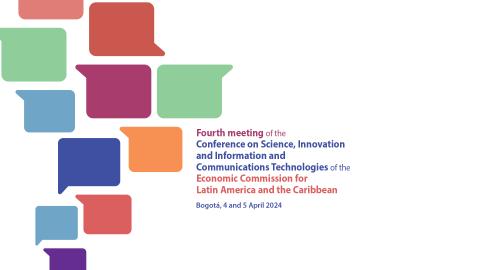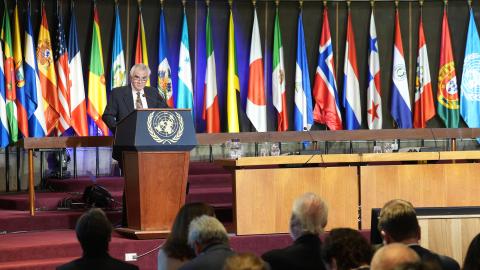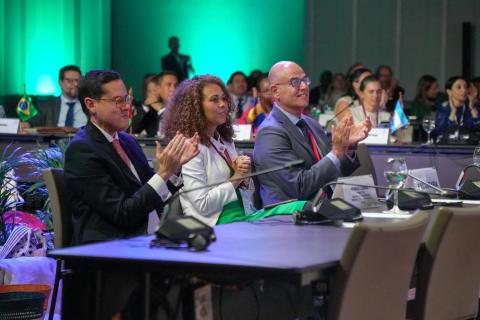Announcement
“This is not about the big States or small States or businesses versus governments. This is how to get co-investment and new types of agreements between the public and private sectors” to direct economic growth towards an intelligent, sustainable and inclusive model, renowned Italian economist Mariana Mazzacato said today at the headquarters of the Economic Commission for Latin America and the Caribbean (ECLAC) in Santiago, Chile.
Mazzucato was the first woman to deliver the Prebisch Lecture –established in April 2001 to mark the 100-year anniversary of the birth of Argentine economist Raúl Prebisch, former Executive Secretary of ECLAC- before a crowded auditorium made up of national and international officials, representatives of the diplomatic corps, academics, students and members of civil society.
“Professor Mazzucato has stormed the global economic debate as a fresh, clear and rigorous voice and, armed with data, has dismantled orthodoxy’s discursive device, unveiling the State’s role not as simply correcting ‘market failures’ but as a powerful creator of new markets,” said Alicia Bárcena, ECLAC’s Executive Secretary, at the beginning of the conference.
Bárcena announced that Mazzucato will participate at ECLAC’s thirty-sixth session, the organization’s most important biannual meeting, to be held on May 23-27 in Mexico City. ECLAC will launch there a new proposal for the regional development condensed in the document Horizons 2030: Equality at the Centre of Sustainable Development.
“Innovation, Mazzucato reminds us, is a collective process, tremendously uncertain and cumulative. Because of that uncertainty, especially at its starting stage, it does not have economic attractive for the private sector with a short term view,” Bárcena contextualized; and added that “the debate proposed by Mazzucato is not only timely but also urgent. It is a debate on economic policy that offers us a renewed view with regards to the State-market-society equation.”
During her presentation, the University of Sussex Professor (United Kingdom) and author of the book The Entrepreneurial State: Debunking Public vs. Private Sector Myths posed three great challenges: achieving a type of growth that is “smart”, requiring improved innovation; “sustainable”, i.e. more green; and “inclusive”, with lower levels of inequality.
In this line, she called on “rethinking the process of wealth creation” in the world, under the concept that “all actors are responsible for creating value,” and posed the need to abandon the absurd idea of a “boring” State that only generates regulatory frameworks for the action of the private sector. It is necessary to make way for “dynamic partnership” between the public and private sectors with a focus on innovation, she said.
“The market failure theory is useful, we shouldn’t throw it out, but it is not enough for tackling these big challenges,” said the academic, who examined diverse aspects to consider in terms of economic policy.
For example, how to encourage democratic debates within countries to establish the possible directions of economic growth; how to build “exploratory” organizations that work under the trial-and-error approach; how to evaluate the State’s investments focused on creating new markets; and how to forge new agreements between public and private sectors in which growth’s risks and benefits could be shared.
“Thank you Mariana for these ideas on rethinking new forms of growth with innovation, social inclusion and wealth creation,” Bárcena said. “We have to start a new conversation, a new deal. We have to identify these private and public actors that are willing to enter into this mission on growth with investment and employment you invited us,” the United Nations senior representative concluded.



